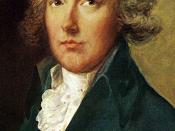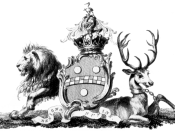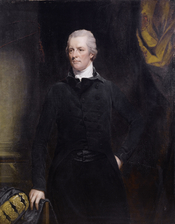William Pitt was an unexpected choice after only 3 years political experience, and a very unusual choice for Prime Minister, with his limited political experience. His appointment was linked to his background, and also reflected the unusually unstable situation. Finally, he was elected because he was the kings last choice.
William Pitt was born in Kent, May 28, 1759, and was second son of William Pitt the Elder, 1st Earl of Chatham. His father was a brilliant speaker, and throughout Pitt's early years, he taught him how to give good speeches, which in later life his greatest opponent would be impressed of. Pitt was very intelligent, and worked very hard. He was educated at home, and was able to quickly master detail and information. Pitt soon went onto study at Cambridge at the very early age of 14. However, he was plagued by medical problems, and was not able to commit fulltime to his studies until he became better.
Pitt from an early age was indoctrinated into politics by his father. He came to be Prime minister after a tumultuous period of British political history.
Pitt entered government through a pocket borough after a failed attempt in Cambridge. He won the seat for Appleby (Westmoreland), in January 1781, at the very young age of 21yrs and 7mths. Ironically, Pitt was elected into government by the way that he was to attempt to eradicate in later years, Lord North, a Tory and a supporter of the King, was in government in 1780. After a general election in this year, he had a strong majority, and the kings confidence "ÃÂ a key thing for any government. However, he inherited the American problem. It was in these years that the American civil war was going on, and essentially it cost him his post. After the loss at Yorktown in 1781 "ÃÂ a key turning point for the war - the British effectively surrendered. North realized that his career was over. However, he stays in at the kings request for 6 more months. The independents in this time swing against North. At this time, the independents were highly important, as they constituted a large number. The king at this time threatened to stand down "ÃÂ abdicate. However, in the end, he allowed North to step down. He had to accept the Rockingham, from the Whig party. He had been betrayed- the closet had been stormed.
The Marquess of Rockingham was a coalition, with Fox as foreign minister, and Shelburne as Home secretary. Rockingham granted the colonies independence from the UK, and he started to introduce economic reforms. From the setup of the cabinet, we can see there was a variety of people with many different aims/beliefs. Pitt was offered a post in this government, yet he replied saying he wouldn't accept a subordinate position. Unfortunately, Rockingham died in July 1782. Fox and Shelbourne resigned.
It was after this event that Shelbourne took office by himself. He had unfortunately little support in the commons. Shelbourne tried to broaden his support by inviting Fox to taken a part in his ministry. Fox refused, Pitt was the messenger and took it as a insult. Pitt was appointed to Chancellor of the Exchequer. Shelburne's ministry was brought down Fox and North fighting against them in the commons. They criticized the draft terms from the treaty of Versailles. This attacking brought them the support of the independents, and Shelburne lost his majority. Shelburne resigned in February 1883.
This left the king with a problem. He had no one to tern to; that he felt he could trust. There was a vasilation. For 5 ÃÂý weeks the king was in despair. He wanted to avoid Fox/North coalition. He called it the "infamous coalition"ÃÂ, and saw it as two men, power hungry looking to get into office. He especially disliked North, for betraying him, and going over to his enemy Fox. However, he had no choice. Fox and North stormed the closet, and came into power in April 1783. He offered the post to Pitt, yet he declined. He realized if he came in to soon he would have no support, and would be out as soon as he came in.
From the start, the King denied them royal patronage. Although the coalition had parliaments support, its had no royal support, and the public confidence gradually dwindled over the course of their office. This was due to the fact that their new peace treaty which they brought Shelburne down on, was exactly the same! Also, The prince of Wales debts. Fox felt obliged to sanction money from the privy purse. At first it was ÃÂã100,000, but after a bit it was reduced to ÃÂã 50,000, still a considerable sum for those days. Finally, he voted for ÃÂã60,000 to pay of his debts. However, there was one more key issue- the east India company. He wanted to transfer the power/ command over the east India company from the king to parliament. The chief of it "àWarren Hastings was seen as corrupt, and Burke made it his life's work to get evidence to prove this. So, the bill was voted on in the commons, and was passed with 100 votes.
The king however had no intention of letting it come to pass completely- it still had to go through the lords. He told them, discreetly of course that they would loose royal patronage, and his friendship if they voted for the bill. Surprisingly enough, the bill didn't get through the lords. This was the end of the North/Fox coalition. The king summoned them for their seals of office.
On The 19th December 1783, William Pitt the younger took office, and would stay there for the next 19 years. He had been an mp for 2 years, and with limited ministerial experience came to lead Britain. Many comments, such as a kingdom trusted to a school boy, and the mince pie administration were thrown around at the time. However, the kings choice was proved to be more shrewd than it seemed. Pitt told the king to wait until dissolving parliament, as the Fox/North supporters were still there. He realized he needed to target the independents. The election was held in 1784, and Pitt won it with a landslide victory. A victory for the king, A victory for Pitt.
The kings prerogative was restored, and political calm was to settle again. William Pitt's appointment was a culmination of other peoples failures, and being the only other option available at the time to the king. After a long line of successive failures and downfalls, Pitt eventually led Britain for 18 years.





